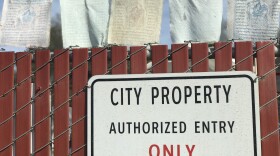Homelessness is becoming more and more visible across the Central Coast. In Santa Cruz, the most glaring sign of the homeless crisis is a large encampment near one of the city’s main entrances. The camp will again be a topic of Santa Cruz’s City Council meeting on Tuesday. The plan is to close the camp after figuring out where everyone could go.
A tent city is one of the first things you see when driving into Santa Cruz off Highway 1 and onto River Street. Dozens of brightly-colored tents are sprawled across a muddy lot next to a shopping center. About 100 people sleep here and up to 200 hang out during the day.
The unsanctioned camp started out as a few tents last fall, but grew in November. That’s when the city closed other areas homeless people were camping in. It shut down a city-run homeless camp and also closed five public parks after a string of fires.
Shannan Vudmaska and her dog moved from one of those parks to the tent city.
“Here, I have some sort of stability, where I know that there is a neighbor to watch my stuff if I have to go to appointments. Somebody can watch my dog if I have to go somewhere where I can't take him,” Vudmaska said.
But the tent city has brought instability to nearby residents at the Tannery Arts Center. It’s an affordable live and work space for artists and their families. An underpass below Highway 1 connects the encampment to the artist community.
Over at the Tannery, Director Jim Brown says the Tannery has a system for reporting problems. He says the number of reports has doubled.
“It’s a wide range, drug deals and, you know, feces on the side of the campus,” said Brown.
Brown recognizes this is a complex problem and believes there’s no single solution.
“There's going to need to be some deeper investments over the long term in mental health services and drug abuse services. But ultimately, we have to tackle all of those problems and not just one or the other,” Brown said.
The City and County of Santa Cruz have brought in porta potties, hand washing stations and help remove trash. Now, they’re trying to transition campers into shelters.
On a gray afternoon, City of Santa Cruz’s Susie O’Hara does outreach in the tent city, telling campers about local homeless services. She says this encampment is not sustainable.
“When you have a very dense population all in a very small area, there's a lot of disorder, a lot of health and safety concerns in the encampment,” O’Hara said.
Two people recently died here. A tent also caught fire from a cooking flame. O’Hara says ambulances are called to the tent city on a regular basis.
The city and county plan to work together to eventually close this unsanctioned camp. But first, they have to increase the number of beds at local shelters to make sure people have a place to go. In 2018, the 9th U.S. Circuit Court of Appeals ruled that prosecuting homeless people for sleeping on public property when shelter is not available violates the Eighth Amendment. The case, Martin v. City of Boise, began in 2009.
The Salvation Army Community Center in downtown Santa Cruz opened up as an at-risk shelter in mid-February to help. The center now provides 40 beds for women, families and people who are handicapped.
Salvation Army Captain Harold Laubach says people who stay here get a hot meal, access to showers and healthcare services. He says more and more people are staying here. Still, he says they have empty beds most nights.
He says one challenge is that not everyone is interested in a shelter situation. Shelters range from no barrier programs, ‘come as you are’, to high barrier, where perhaps they breathalyze clients.
“And of course the higher barrier the program, the more people that are unwilling to go. So we don't consider our shelter programs high barrier. We consider them low barrier, but they are not no barrier, right. So when you come in, there are still behavior rules,” Laubach said.
The city and county’s goal is to open a low barrier, 100-bed shelter with day services by July. The shelter would be a navigation center, meaning it would provide tools to help navigate people out of homelessness.
Homeless advocate and Food Not Bombs Cofounder Keith McHenry hopes the community doesn’t block the navigation center.
“We have to have the power and the strength to really do that and to stop demonizing people living on the streets and to have a NIMBYism, which blocks every possible solution that is ever proposed or offered,” McHenry said.
McHenry hosted a workshop at the tent city on February 27 to educate homeless people about their rights and the Martin v. City of Boise federal court decision.
No date has been set for closing the camp yet. The Santa Cruz City Council meeting begins at 7pm Tuesday. It's expected city leaders will discuss a list of potential city-owned sites for transitional encampment and safe parking spots. City leaders are also expected to give an update on additional shelter services coming online. The outdoor shelter on River Street will reopen; the Salvation Army has been selected to operate it.
Friday AM Update: Santa Cruz City Council set a provisional closure date of April 17 for the tent city. That's only if campers have at least a week's notice and alternative programs are up and running.
It's expected the shelter on River Street will reopen on April 17.










